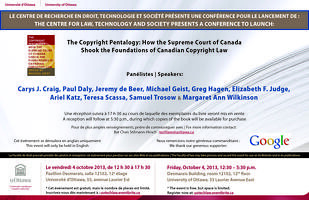Appeared in the Toronto Star on August 31, 2013 as Schools Navigate Learning Curve for New Copyright Rules As students and faculty prepare to head back to campus this week, many will be greeted by new copyright guidelines that clarify how materials may be used without the need for further […]

Fair Dealing by Giulia Forsythe (CC BY-NC-SA 2.0) https://flic.kr/p/dRkXwP
Copyright
The Copyright Pentalogy Conference – Free Registration Now Open
Registration for the conference on the Copyright Pentalogy: How the Supreme Court of Canada Shook the Foundations of Canadian Copyright Law is now open. The conference is scheduled for Friday, October 4th from 12:30 to 5:30 with a reception to follow. There is no cost for the conference, but advance registration is appreciated. Speakers include Carys Craig, Paul Daly, Jeremy deBeer, Greg Hagen, Elizabeth Judge, Ariel Katz, Teresa Scassa, Sam Trosow, and Margaret Ann Wilkinson.
U.S. Copyright Lobby Takes Aim at Canadian Copyright Term Through Trans-Pacific Partnership
The U.S. copyright lobby, led by the International Intellectual Property Alliance, appeared last week before a U.S. Congressional Committee hearing on the Trans-Pacific Partnership and made it clear that it wants the U.S. to use the trade agreement to force Canada to extend the term of copyright. Canadian copyright law is currently at life of the author plus 50 years, which meets the international standard found in the Berne Convention. The U.S. extended its copyright term years ago to life of the author plus 70 years under pressure from the Disney Corporation (Mickey Mouse was headed to the public domain) and has since pushed other countries to do the same.
The IIPA says that the TPP should require all members to extend their term of copyright (Japan and New Zealand are also at life plus 50 years), which it claims is needed to “maintain incentives for investment in the conservation and dissemination of older works.” Yet a recent study found the opposite with far more public domain books available commercially than books still subject to copyright.
When the Canadian government conducted a consultation on participation in the TPP, copyright was the top issue raised with many focusing on concerns associated with term extension. As I wrote last year, it is worth noting the many important authors who would be immediately affected since their works are scheduled to become public domain in the 2013 – 2033 period.
Save the Date: The Canadian Copyright Pentalogy Conference on October 4, 2013
Earlier this year, the University of Ottawa Press published The Copyright Pentalogy: How the Supreme Court of Canada Shook the Foundations of Canadian Copyright Law, an effort by many of Canada’s leading copyright scholars to begin the process of examining the long-term implications of the copyright pentalogy. The book is […]
The “Miracle in Marrakesh” Provides a New Path for Digital Access
Negotiators from around the world gathered in Marrekesh, Morocco late last month for a diplomatic conference aimed at concluding a new United Nations treaty to improve access to copyrighted works for people who are blind or have other perceptual disabilities. Despite years of discussions, there was ample reason for pessimism.
My weekly technology law column (Toronto Star version, homepage version) notes the treaty talks had become bogged down in the months leading up to the conference, with large lobby groups such as the Motion Picture Association working feverishly behind the scenes to undermine it through changes to rules on digital locks and fair use.
As the deadline approached however, the majority of the world lined up behind user rights for the blind. With Canada playing an important facilitative role, the negotiators were ultimately able to craft compromise language that resulted in a new landmark treaty. More than 50 countries immediately signed on, suggesting that the treaty is well on its way to establishing new rights for the blind (20 countries must ratify it before the treaty formally takes effect).







